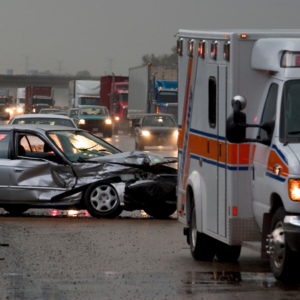 If you or a loved one have been involved in a car accident, seek medical attention right away, even if you feel fine at first. Immediately after an accident, your body is flooded with adrenaline, potentially masking pain, trauma, and injuries. Things like whiplash, neck pain, or head injuries might not show up right away but can make you feel dizzy or unwell later, even leading to vertigo. By seeing a doctor right after the accident, you can catch any hidden injuries before they get worse, and you are able to establish documentation of a timeline for your personal injury claim. Contact our car accident injury attorneys at Regan Zambri Long for your free case evaluation.
If you or a loved one have been involved in a car accident, seek medical attention right away, even if you feel fine at first. Immediately after an accident, your body is flooded with adrenaline, potentially masking pain, trauma, and injuries. Things like whiplash, neck pain, or head injuries might not show up right away but can make you feel dizzy or unwell later, even leading to vertigo. By seeing a doctor right after the accident, you can catch any hidden injuries before they get worse, and you are able to establish documentation of a timeline for your personal injury claim. Contact our car accident injury attorneys at Regan Zambri Long for your free case evaluation.
Vertigo usually happens when there’s a problem with the part of your body that controls balance, called the vestibular system. This system includes your ears and nerves, working together to send signals to your brain about how you move and stand. A car accident or head injury can shift and disrupt your balancing centers, causing spatial orientation disassociation and vestibular vertigo.
Vertigo is a feeling that makes you feel off balance like you’re not steady. It seems like you’re spinning or the things around you are moving, but nothing is moving. These symptoms can bring about severe dizziness as if you are about to fall.
Every case is unique, depending on an array of factors. Considerations include the force and impact endured and who got hurt. Post-traumatic vertigo takes a few days or even weeks to feel it. Usually, this kind of dizziness gets better by itself. When symptoms linger, a doctor can assist with a medical evaluation to examine the integrity of the inner ear and to properly diagnose your vestibular system. Often, physical therapy or medicine is prescribed and shown to be effective. If you have post-traumatic vertigo, it’s essential to talk to a doctor to figure out the best treatment options and treatment plans to feel better.

These sensations can be so intense that they may cause you to feel sick or vomit. Once you have BPPV, simple things like lying down, rolling over in bed, or simply looking up can make you feel dizzy. Doctors can typically assist with BPPV by implementing gentle head movements that act as repositioning maneuvers for the inner ear crystals to adjust.
When you’re in an accident, your body releases adrenaline and endorphins to increase your pain threshold and immediately make you feel less pain. It’s your body’s natural way of helping you handle the situation. Because of this, you might overlook injuries like vertigo, dizziness, neck problems, or even mild traumatic brain injuries (TBIs) right after the accident. These symptoms can show up later once the adrenaline wears off.
Each person’s experience of vertigo is genuinely unique. Vertigo can occur immediately after an accident, or victims may have a delayed response. You can feel dizzy and like everything’s spinning around you, even when it’s not. Some people feel like their head is moving or the room is spinning. This feeling may be fleeting or can last a long time if left untreated. Regardless, vertigo is very unsettling and can become dangerous if left untreated; be sure to receive medical care immediately after a car accident, even if you feel no symptoms.
Other common symptoms of vertigo include:
Car accidents can cause vertigo because the sudden impact or jolt can hurt your head, neck, or inner ear — all parts of your body that help control and stay balanced. All these parts — the head, the neck, and the inner ear — work together to keep you steady. When they get injured, your brain gets confused about which way is up. This can make you feel like everything’s spinning around you. It’s essential to tell a doctor if you’re feeling dizzy and uneasy after a car crash.
When you are in a car accident, the sudden stopping or impact of the accident may cause whiplash, “when inertia causes your head, neck, and body to move at different speeds (Cleveland Clinic, 2024).” A whiplash incident occurs when a neck snaps forward and back quickly, possibly causing muscle, neck, nerve, and disc disturbances. Cervical vertigo occurs in 25-50% of all whiplash cases (National Institutes of Health (NIH), 2006).
Ongoing symptoms of whiplash can include cervical neck pain, balance issues, headaches, migraines, or temporomandibular joint dysfunction (TMJ).

Feeling dizzy after a crash isn’t normal; it’s your brain’s way of telling you something is wrong. If there is enough force, the TBI can cause speech problems, movement disorders, communication dysfunctions, and even death. Seeking out medical care can help with pain and suffering, as well as preventive care.
Cervical vertigo is when you feel dizzy and experience neck pain. Anyone can get cervical vertigo, but you’re more likely to get it if you are a car accident victim and experience whiplash. To make cervical vertigo better, doctors may:
In some cases, neck pain, stiffness, and reduced range of motion can happen along with vertigo. Cervical vertigo usually gets better with treatments like physical therapy, medication, or neck exercises to relieve the tension and improve balance. See a doctor if you’re feeling dizzy and your neck hurts, especially after a car accident. They can determine if it’s cervical vertigo and help you return to normal.
Even if you feel fine after an auto accident, you might still have injuries that can get worse. The head and neck are susceptible and complex; they are our powerhouse governing our everyday movements. It is critical to be evaluated after a car accident, even if you do not feel anything immediately.
Another reason to see a doctor soon is for your injury claim. If you are injured, you’ll need proof immediately to make your claim easier. If you wait too long to see a doctor and your symptoms show up later, the insurance company might question if the car accident caused your injuries or if there was another underlying cause. It’s best to get checked and document everything as soon as possible.
If you or someone you care about has been in a serious car accident and is dealing with significant injuries, reach out to our personal injury team at the law firm of Regan Zambri Long for a free consultation. We’ll review your case at no cost and with no obligation. Our team has the experience, knowledge, and resources to help you get the compensation you need to recover. Let us handle the legal side while you focus on healing.